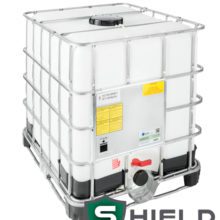
GCUBE Shield took two and half years to develop and claims to offer revolutionary barrier protection compared to fluorinated and six-layer IBCs, with improved product stability, shelf-life and operational performance. Food products are now better protected against oxygen permeation into the container, which means the shelf-life of contents are extended. Equally, solvent-based products or agrochemicals are now better protected against gasses lost, retaining their original characteristics to ensure product performance and effectiveness.
Developed to be applicable to all of Greif’s three-layer machines already producing standard GCUBE IBCs, the innermost layer remains 100 percent high density polyethylene (HDPE) which complies with current legislation for food and chemical compatibility. The newly introduced intermediate layer contains the GCUBE Shield blend that reduces the permeation of gases both in and out of the polyethylene, and the external layer allows customisation including colours and antistatic. The IBC is also recyclable as the barrier blend can be reused for further applications.
Luca Bettoni, Greif EMEA IBC and Plastic Product Manager, explained: “We are continuously investing in our GCUBE IBC solutions and the Shield barrier technology is an extremely significant development. We are the first company to introduce the blend of polymers to proactively reduce permeation from IBCs. Ultimately our investment means that customers benefit from a longer product shelf-life; a reduction in dangerous emissions into the air coming from their product; and increased protection of their product against oxygen permeation from outside the container.”
GCUBE Shield is suitable for a range of markets including flavours and fragrances, paint, agrochemical, speciality chemicals and food and beverages. It is currently produced on sites in Italy and Germany, and will be rolled out to the Netherlands, Russia, China and the US in the near future.
Greif entered the IBC market with the acquisition of Fustiplast in 2010 and claims to have become the fastest growing and highest investing company on IBC production over the last eight years. They have nine IBC facilities across EMEA and 13 globally. Further investment in new facilities is planned, including a new plant in Russia opening in 2019.
